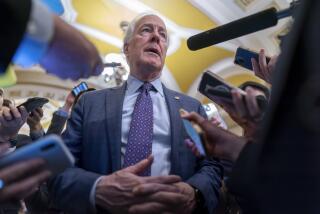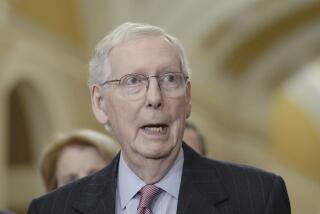Back in Senate, McCain plays against hype
WASHINGTON — Mac is back.
But now, Sen. John McCain is cutting a new profile -- one that is far more partisan than when he became so familiar to Americans months ago as the Republican nominee for president.
As a candidate, McCain cast himself as a uniter of the two parties, willing to buck his GOP colleagues and reach across the aisle to build compromises on immigration, campaign finance and other hot-button issues.
“I have that record and the scars to prove it. Sen. Obama does not,” he said during the campaign, referring to his bipartisan streak.
But this week, with Barack Obama in the White House and McCain back in Congress, the Arizona senator has played a prominent and uncompromising role in rallying Republican opposition to the Democratic majority and its stimulus plan.
McCain did not join the small group of centrists from both parties who worked this week to put together a compromise to let the stimulus bill move forward. Instead, he took to the floor and pushed a Republican alternative that was heavier on tax cuts and offered less government spending than President Obama wants.
McCain secured the support of every Republican. The Senate rejected the plan 57 to 40.
McCain has a long-standing reputation as an enemy of excessive spending. His opposition to pork-barrel politics puts him in sync with leaders of his party, who want to bolster a Republican image as the party of small government and fiscal responsibility.
Still, McCain’s actions in the stimulus debate make for a different leadership profile than he touted during the presidential campaign. His current push for tax cuts as well as spending cuts and his sharp rhetoric are a far cry from his role a few years ago in leading a bipartisan coalition that sought compromise on how the Senate handles judicial nominations.
In debate Friday, he reminded his colleagues that the so-called Gang of 14 he led on judicial nominations was composed of seven Republicans and seven Democrats -- whereas the group trying to find a stimulus compromise involved only three Republicans, he said.
“That’s not bipartisan,” McCain said.
“John has been a budget hawk all his life,” said McCain’s friend Sen. Lindsey Graham (R-S.C.).
“He’s been in every gang that’s been up here. But he believes any gang brokered with three or four Republicans is not what the public wants.”
Day after day, McCain has been on the Senate floor criticizing Obama’s package with the core Republican message. “This bill has become nothing more than a massive spending bill,” he has said. “To portray it as stimulus flies in the face of reality.” He has called the legislation an “unnecessary, wasteful bill.”
Responding to the Republican critique, Obama has said that his election to the White House was a mandate to take a new direction in tax and spending policies, and that McCain’s ideas, which are heavy on tax-cutting, have been discredited by the economic downturn the country is already suffering.
But McCain has a different view of the lessons of the 2008 election.
“We just lost an election, and I will take the responsibility for that,” he said on the Senate floor. “One of the reasons why Republicans lost the last election is because our base, who are concerned about our stewardship of their tax dollars, believes we got on a spending spree.”
The presidential campaign made McCain one of the most prominent members of a troubled Republican Party. And it may have also made him a different kind of Republican in his old Senate job.
“We’re a party without a leader,” said John Weaver, a former McCain aide. “McCain has to carry the banner of the Republican Party and the base. And he campaigned on a conservative economic agenda. It would be hard to walk away from that.”
--
More to Read
Get the L.A. Times Politics newsletter
Deeply reported insights into legislation, politics and policy from Sacramento, Washington and beyond. In your inbox three times per week.
You may occasionally receive promotional content from the Los Angeles Times.











